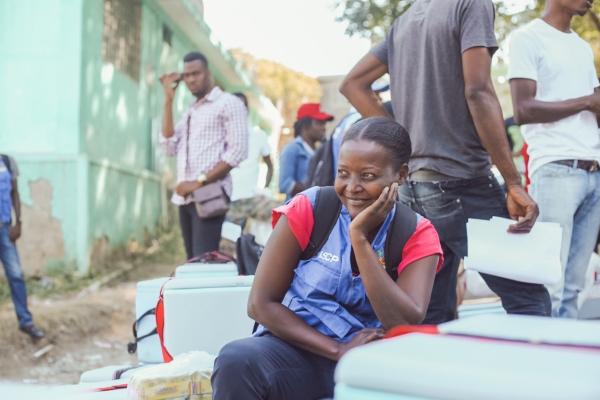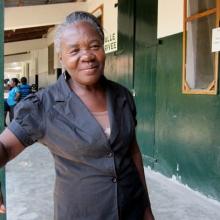The mood in the restaurant was loud and jovial. I was in Haiti, out for dinner with a group of Haitian colleagues celebrating someone’s birthday. At one point the conversation turned more intense, voices rising in Haitian Kreyol and volleying back and forth, fists pounding the table amidst occasional fits of laughter. “They’re talking about Haiti’s history,” one of my colleagues explained, smiling.
Next week will be Canada’s thirty-third annual International Development Week, a celebration of Canadian contributions to reducing global poverty and building a more peaceful and prosperous world. The theme of the past three years has been ‘Go for the Goals’, a call to action for the achievement of the 2030 UN Sustainable Development Goals, optimistically and unapologetically focussed on the future.
There is plenty to celebrate. From health to agriculture to gender equality to economic development, Canadian expertise, energy, and funding has changed countless lives for the better. And yet, for civil society and a public sector concerned with global inequality, we do a disservice to ourselves and more importantly to our global partners by only looking forward.
“History,” the late Partners In Health co-founder Dr. Paul Farmer reminded us, “didn’t begin when you arrived.” Dr. Farmer meant it as a plea for humility alongside our ambition to make a positive difference in the world, because ignoring the past when trying to make sense of the present is a luxury of the privileged.
My Haitian colleagues at the restaurant that night, several of them physicians, were undoubtedly privileged in the Haitian context. But they worked within a broader health system that was starved of the resources it needed to fulfill its putative role of healing the sick. Most of the sick were also desperately poor. The poverty of individuals and the poverty of the system were deeply connected.
In the same way that clinicians treat patients for illnesses whose underlying cause is poverty, the international development community works on issues whose underlying cause is most often structural injustice. In order to be effective, we must learn that history of injustice from those who have experienced it and use their expertise to inform our work. In this light, ‘international development’ doesn’t cut it.
That’s why we should advocate for this to be Canada’s last International Development Week. We could do better by remembering to check our blind spots and the rear-view mirror with Global Solidarity Month instead.
The difference is more than three more weeks and semantics. Solidarity is a recognition of common interests across geographies, in this case based on shared understanding that geopolitical and economic decisions made by countries and global institutions over decades or even centuries – rooted in colonialism, racism, resource extraction, and greed – have stacked the deck and continue to do so today, dealing out wildly unequal hands.
Consider just a few snippets of the ‘development’ history since International Development Week (IDW) was founded. At the time of the first IDW in 1991, the AIDS epidemic was just gathering momentum. HIV changed from a death sentence to a chronic disease in the West with the advent of drug cocktail antiretroviral therapy in 1996. Across Africa, meanwhile, more than 23 million people would die over the next two decades of a disease that the world already knew how to treat. Despite this crushing human loss, the AIDS treatment movement is considered a big success in development circles.
During the 2014-16 Ebola Virus Disease (EVD) epidemic in West Africa, clinical protocols were put in place for dying patients in Guinea, Liberia and Sierra Leone that expressly prohibited one of the very supportive treatments – intravenous rehydration – that could have kept patients alive. Why? Because the colonial project left no functioning health systems. Because the risk of expat health workers being infected often took precedence over the risk of local patients dying. Because alongside bravery and heroism, there is an entrenched paradigm of disease prevention and disease containment drowning out actual disease treatment in emergency contexts … for poor patients in poor parts of the world.
During the Covid-19 pandemic, access to vaccines was determined by who had the ability to produce vaccines, to purchase vaccines, and to restrict the supply of vaccines (by pharmaceutical companies refusing to share the recipe, and governments refusing to compel them to do so).
An absence of global solidarity over generations, not just during crises, led to all of these outcomes. The failures of a global system that led to such unequal distribution of global public goods for the poorest and rapidly increasing riches for the wealthiest may not be the fault of the international development sector, but neither can we turn away. The localization agenda, which seeks to re-center power, decision-making and authority in local communities, is one much-needed response to these challenges, but we still risk trivializing the agency of those with whom we seek to partner if we fail to understand where they’re coming from.
Perhaps we’re starting to learn that solidarity is needed at home in our interactions with Indigenous populations in Canada, who have always known their own painful histories. Solidarity framing is appearing more frequently in conversations around climate, race, gender, and disability. It’s popping up in new international frameworks such as the Global Public Investment movement, which seeks to integrate shared responsibility at national and transnational levels into the public financing landscape for health and social rights. In Spain, the lower house of the Spanish parliament recently passed a ‘Cooperation for Sustainable Development and Global Solidarity Bill’ that, among other things, seeks to entrench a commitment to spend 0.7% of gross national income on official development assistance.
So how might Global Solidarity Month in Canada be different from what we have now? Let’s start with a simple goal: a website. On this website, for every country where a Canadian organization works, and for every country to which Canadian government funding flows, there would be a story. It would be a history, written by people from that country, and it would tell a story they want to tell.
We would read these stories, more than 100 of them, and would take them in. We need a month because it takes time to learn, and to be honest about what solidarity requires.

